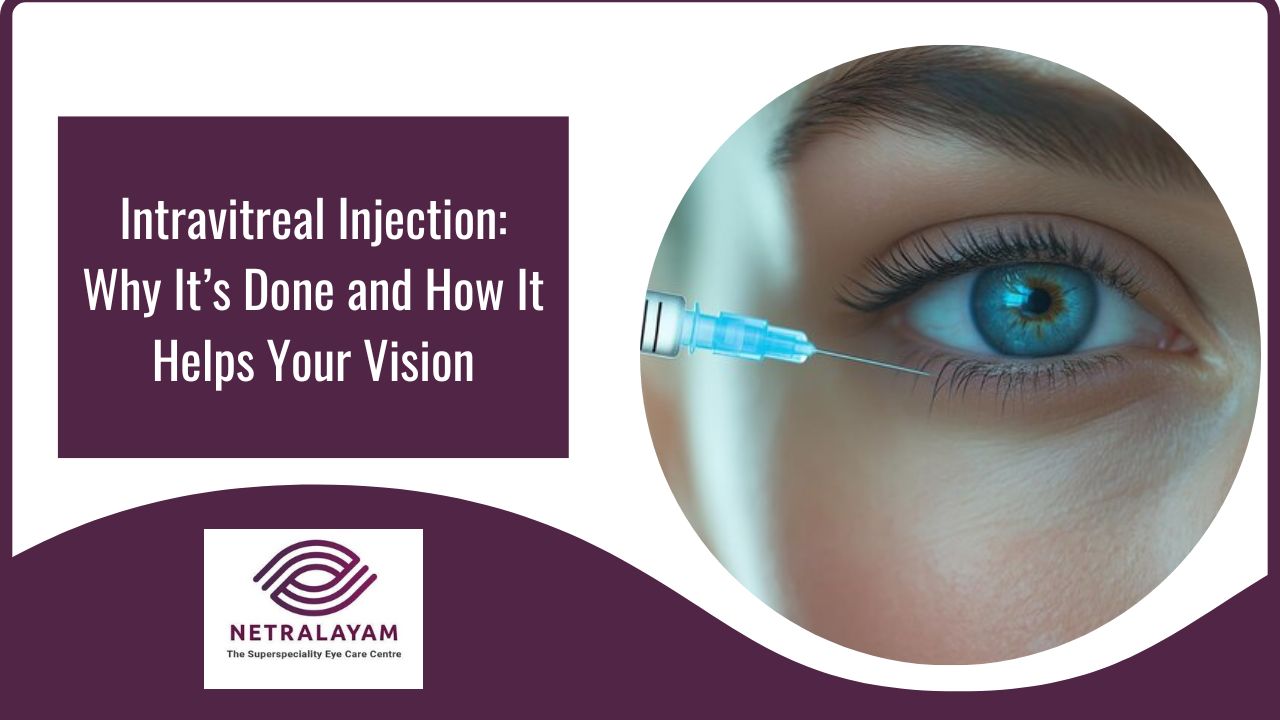Committed to Eye Care with Compassion, Technology and Competency
Committed to Eye Care with Compassion, Technology and Competency

11/19/2025
Hearing the words “eye injection” can make anyone uneasy. In reality, intravitreal injections are among the safest and most effective treatments in modern eye care. These tiny, targeted injections deliver powerful medication directly to the back of the eye, helping stop vision loss and, in many cases, even restore clarity affected by retinal diseases.
Whether it’s diabetic eye disease, age-related macular degeneration, or retinal inflammation, this precise treatment plays a crucial role in preserving and protecting your sight.
Explore how direct delivery of medication into the eye can stop disease progression and restore clarity.
The term “intravitreal” combines two words “intra” meaning inside, and “vitreous” referring to the gel-like substance that fills the center of your eye.
An intravitreal injection involves delivering medication directly into this vitreous cavity, allowing it to reach the retina, the delicate, light-sensitive layer at the back of the eye, where it’s needed most.
It’s a minimally invasive, outpatient procedure performed under local anesthesia. The process usually takes only a few minutes, and patients can return home right after.
Intravitreal injections are preferred because they deliver medicine exactly where it’s needed. Here’s why specialists choose this approach over tablets or eye drops:
Eye drops and oral medications can’t easily reach the retina due to natural barriers in the eye. Injections bypass those barriers, ensuring the medicine works right where it’s required.
The medication reaches the retina and macula directly, providing a focused and effective treatment for retinal conditions.
Because the drug is placed precisely inside the eye, it acts quickly to reduce swelling, control bleeding, and stop the growth of abnormal blood vessels.
Intravitreal injections are used in several retinal disease treatments, including:
Understanding the process can ease much of the anxiety surrounding it. Here’s what typically happens:
Your eye will be cleaned with antiseptic and numbing drops will be applied. The area around your eye is then covered with a sterile drape to prevent infection.
The injection is given in the white part of your eye (the sclera). It takes only a few seconds, and most patients feel little more than mild pressure.
Because of local anesthesia and sterile technique, the intravitreal injection procedure is highly safe and well-tolerated. Patients are monitored briefly afterward before heading home.
Intravitreal injections target the root cause of many retinal problems: swelling, bleeding, and abnormal blood vessel growth.
Different conditions require different types of medications:
Your ophthalmologist decides the best medication based on your diagnosis and eye health.
Recovery after an intravitreal injection is usually quick and smooth.
Contact your doctor immediately if you experience pain, persistent redness, or sudden vision loss. These may indicate a rare infection or complication that needs urgent care.
Intravitreal injections are one of the most powerful tools in modern retinal care. They deliver life-changing results for patients who might otherwise face irreversible vision loss. With timely diagnosis and expert administration, this treatment can help preserve, and even restore your eyesight.
If you notice sudden blurring, distortion, or dark spots in your vision, don’t delay. Early consultation with a retinal specialist can prevent lasting damage and protect the gift of sight.
Vision is precious, and with the right care, it can stay that way. Netralayam offers world-class retinal diagnostics and intravitreal injection treatments, ensuring you see the world clearly and confidently again.
Book your appointment today, because every clear sight begins with expert care.
Not really. Before the procedure, numbing drops are applied, so most patients feel only mild pressure or discomfort, not actual pain.
Results vary, but many patients notice clearer vision or reduced swelling within a few days to a few weeks, depending on the eye condition.
When performed by experienced retinal specialists under sterile conditions, intravitreal injections are considered extremely safe and highly effective for treating retinal diseases.
Certain retinal conditions can be chronic, meaning repeat injections may be needed occasionally to maintain stability and prevent further vision loss.
Not always. Many patients need frequent injections initially, but the interval often reduces or stops as their condition improves and stabilizes.

Leave a Reply Cancel reply